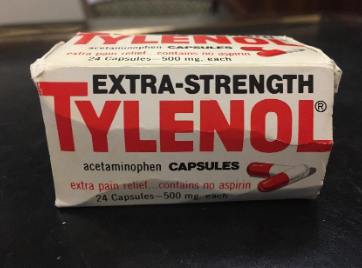The Tylenol Cyanide Deaths and the Legacy of the Lawsuits
 In 1982, seven people died after they consumed Extra-Strength Tylenol that was laced with potassium cyanide. The first killing happened in September of 1982 when 12-year-old Mary Kellerman took Tylenol for a cold. That same day, Adam Janus died after he took it. Janus’ brother and sister-in-law, due to their headaches from grieving Adam’s death, also took the Tylenol, resulting in their deaths, as well. Three others in the Chicago area died, too, and fear gripped the country about who and how someone could have tampered with the pills. As a result of the seven deaths in a three-day period, Tylenol pulled every bottle of Tylenol medicine off store shelves nationwide, recalling 31 million bottles of Tylenol capsules.
In 1982, seven people died after they consumed Extra-Strength Tylenol that was laced with potassium cyanide. The first killing happened in September of 1982 when 12-year-old Mary Kellerman took Tylenol for a cold. That same day, Adam Janus died after he took it. Janus’ brother and sister-in-law, due to their headaches from grieving Adam’s death, also took the Tylenol, resulting in their deaths, as well. Three others in the Chicago area died, too, and fear gripped the country about who and how someone could have tampered with the pills. As a result of the seven deaths in a three-day period, Tylenol pulled every bottle of Tylenol medicine off store shelves nationwide, recalling 31 million bottles of Tylenol capsules.
When tested, each of the capsules taken by the victims proved to be laced with potassium cyanide at a level toxic enough to have caused thousands of fatal doses. Police were baffled as the pills came from different production plants and were sold in different pharmacies around the Chicago area. Police concluded that it was highly unlikely that the attacker acted alone and that the tampering occurred while the Tylenol was on store shelves.
At the time, over-the-counter medicine was not required to have tamper-resistant packaging. That is the case’s legal legacy.
In 1982, within five weeks of the incident, Tylenol started placing some sort of tamper-proof product on the market. In 1983, Corboy & Demetrio filed lawsuits against Johnson & Johnson on behalf of the families of three of the victims. That same year, the Tylenol bill was passed, making it a federal offense to tamper with products. And in 1989, the FDA established tamper-proof guidelines.
In 1991, on the eve of the trial, Corboy & Demetrio and Attorney Leonard Ring, who represented the other victims' families, negotiated a confidential settlement for the families of all the victims. The fact that a manufacturer of an over-the-counter medicine could be held responsible for the intentional act of a third party made huge waves in the medicine industry.
When the cases settled, improvements to the safety of over-the-counter medicine included packaging with multiple barriers: a glued flap to seal medicine’s carton, a plastic seal around a medicine’s bottle and a foil lid sealing its top. Those safety improvements are still in place today.
Corboy & Demetrio is proud to have played a role in the improvement of safety of medicine for consumers everywhere.

